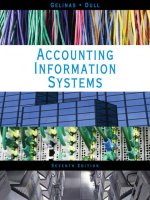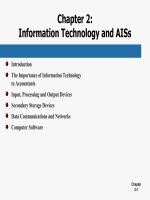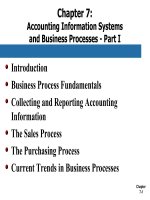Accounting information systems 12th SIMKIN and norman chapter 14
Bạn đang xem bản rút gọn của tài liệu. Xem và tải ngay bản đầy đủ của tài liệu tại đây (508.34 KB, 57 trang )
Chapter 14:
Accounting on the Internet
Introduction
The Internet and the World Wide Web
XBRL - Financial Reporting on the Internet
Electronic Business
Privacy and Security on the Internet
Chapter
14-1
The Internet and
World Wide Web
Internet Addresses and Software
Intranets and Extranets
The World Wide Web, HTML, and IDEA
Groupware, Electronic Conferencing, and Blogs
Chapter
14-2
Internet Addresses and
Software
Domain Address
Also called a Uniform Resource Locator (URL)
www.Name.com.uk
Internet Protocol (IP)
Numeric address of domain address
207.142.131.248
Transmission Control Protocol (TCP)
Chapter
14-3
Intranets and Extranets
Intranets
Based on same software as the Internet
Internal to the organization
Outsiders are unable to access information
Extranets
Enable external users to access intranets
Utilize passwords or private data communications channels
Chapter
14-4
The World Wide Web,
HTML, and IDEA
World Wide Web
Multimedia portion of the Internet
Hypertext Markup Language (HTML)
Editing language
Used in design of web pages
Hypertext Transfer Protocol (HTTP)
Communications protocol used to transfer web pages
Chapter
14-5
HTML Code
Chapter
14-6
Display of HTML Code
Chapter
14-7
Groupware, Electronic
Conferencing, and Blogs
Groupware
Allow users to complete numerous tasks electronically
Send and receive e-mail, collaborate on work tasks, schedule appointments, share files
Software include Exchange, Groupwise, Lotus Notes, and Outlook
Chapter
14-8
Groupware, Electronic
Conferencing, and Blogs
Instant Messaging Software
Remote
users communicate in real time
Electronic Conferencing
Knowledge Management
Programs
utilized to distribute expertise within the
organization
Blogs
Collaboration
tool
Create, share, and leverage knowledge
Chapter
14-9
Study Break #1
Which of the following is most likely to contain only numbers?
A.Domain address
B.URL address
C.IP address
D.Postal address
Chapter
14-10
Study Break #1 - Answer
Which of the following is most likely to contain only numbers?
A.Domain address
B.URL address
C.IP address
D.Postal address
Chapter
14-11
Study Break #2
Which of the following enables users to view data with a web
browser?
A.Intranet
B.Extranet
C.Internet
D.All of these
Chapter
14-12
Study Break #2 - Answer
Which of the following enables users to view data with a web
browser?
A.Intranet
B.Extranet
C.Internet
D.All of these
Chapter
14-13
XBRL - Financial Reporting
on the Internet
eXtensible Markup Language (XML)
Similar to HTML
Users define their own tags
XML tags describe the data
eXtensible Business Reporting Language
Tags are standardized for business reporting purposes
Chapter
14-14
XBRL Code
Chapter
14-15
XBRL - Financial Reporting
on the Internet
XBRL Instance Documents and Taxonomies
Must understand the standard tags
Must understand the rules that govern the use of the tags
Current Status of XBRL
XBRL International Consortium
Chapter
14-16
How XBRL Affects Accountants
Chapter
14-17
XBRL - Financial Reporting
on the Internet
The Benefits of XBRL
Transmit financial data in standard format
Data items are uniquely defined
Searching for tags is easier (IDEA)
Data is self-checking
Automatic and reliable exchange of financial information
Companies are not constrained to specific formats
Chapter
14-18
XBRL - Financial Reporting
on the Internet
The Drawbacks of XBRL
Requires new users to learn, and conform to, the standards of the language
Evolving standards require conformity to changing specifications
No requirement for auditors to provide assurance
Costs of transition
Chapter
14-19
Study Break #3
All of the following are markup languages (that use edit tags)
except:
A.HTML
B.BYTE
C.XML
D.XBRL
Chapter
14-20
Study Break #3 - Answer
All of the following are markup languages (that use edit tags)
except:
A.HTML
B.BYTE
C.XML
D.XBRL
Chapter
14-21
Study Break #4
A document file containing XBRL tags is a(n):
A.Extranet document
B.Intranet document
C.Instance document
D.URL
Chapter
14-22
Study Break #4 - Answer
A document file containing XBRL tags is a(n):
A.Extranet document
B.Intranet document
C.Instance document
D.URL
Chapter
14-23
Electronic Business
Definition
Conduct of business with computers and data communications
Categories of Electronic Commerce
Retail sales
E-payments and E-wallets
Electronic data interchange
Cloud-computing services
Chapter
14-24
Retail Sales
Overview
Virtual
stores to sell directly to customers
Automated AISs
Problems with Internet Retail Sales
Legitimacy
of web sites
Reliance upon e-mails
Reliance upon suppliers
Click fraud
Privacy concerns
Chapter
14-25









